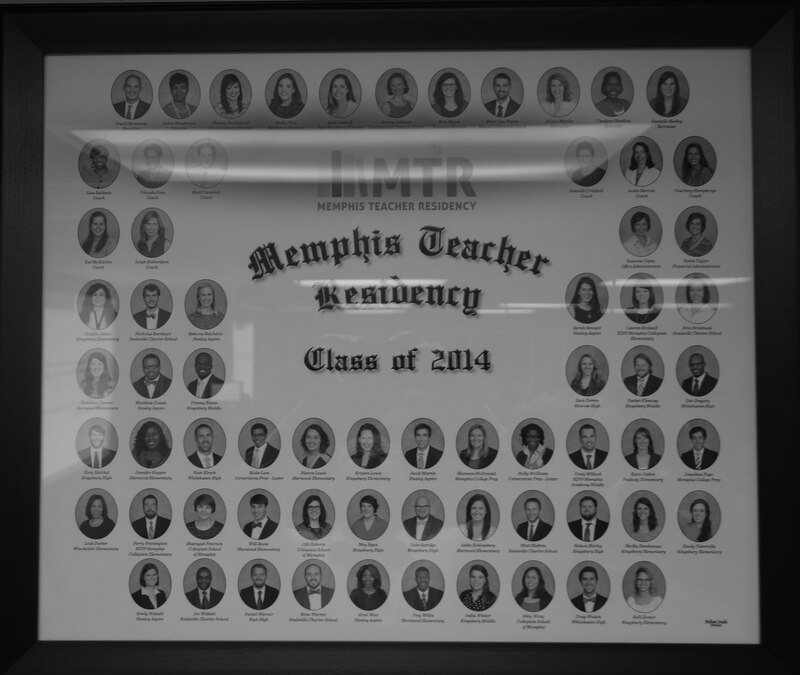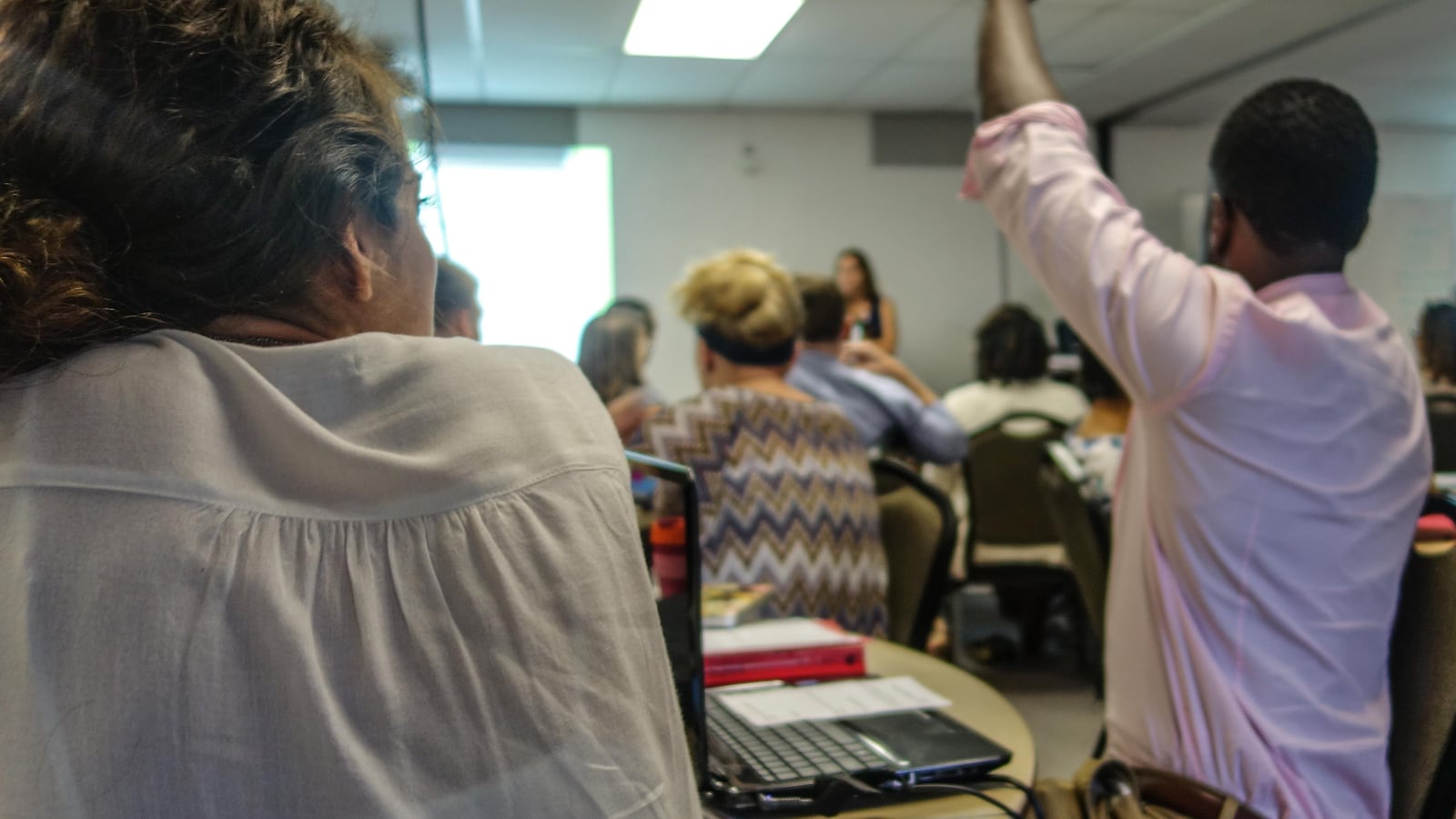It’s just past 8 a.m. in the basement of Union Avenue Baptist Church in the middle of the summer. A room full of 67 young adults who had not yet started working in Memphis classrooms this August, and had been out of college for barely a month, were trying to break down the factors that make one teacher effective, and another teacher ineffective.
One teacher resident observed that an ineffective teacher blamed the student instead of considering a different way to reach them.
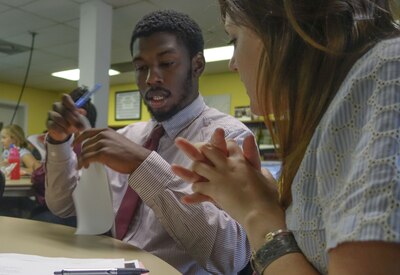
After several more responses one of the two instructors in the room, Leah Luttrell, steps in to explain a concept called “asset based thinking.”
“Every child has something to offer,” Luttrell said. “As humans, as people made in the image of God, we’re incredibly complex, we’re incredibly unique. To get to the point where we say there’s something wrong with Mitch, who are we to say that?”
The room breaks into laughter.
Most teacher preparation programs offer some instruction on withholding judgement of students. But by comparing a teacher’s judgement to God’s judgement, the teacher under scrutiny looked not only ineffective, but absurd to this particular room of educators.
The Memphis Teacher Residency (MTR), one of the most highly praised teacher preparation programs in Tennessee, has borrowed the “residency” model of teacher development. The residency model combines practices of alternative preparation programs such as Teach for America, which give immediate experience in the classroom, with a more gradual approach into being full-time teachers.
Districts in Tennessee and across the country have worked to better attract, train and retain quality teachers, as some influential studies have shown that teacher quality is one of, it not the, most important factor for raising student achievement. The University of Memphis has recently made plans for a new teacher training program that would emulate the residency program model.
MTR’s teachers are staying longer than other alternatively-certified teachers. More than 90 percent teach for three years after their residency year, and 75 percent of those continue to teach in Memphis past their initial four year commitment.
The average MTR resident has a TVAAS score between 4 and 5, with 5 being the highest. TVAAS, is a state’s growth measure used to determine how much a teacher contributes to student improvement.
Its first four years it trained just over 20 teachers per year. But last year they doubled the number of teachers they trained. This year, 67 teachers were trained through the program.
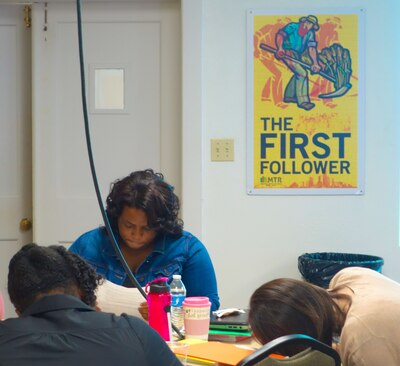
MTR Director and Founder David Montague said MTR residents don’t prosthelytize with their words.
“I’m the first one to tell every resident that you’re coming here to learn how to be a very effective teacher,” said Montague. “And if you’re coming here to be disguised as a youth minister, then you’re in the wrong place.”
How it works
Teachers in MTR spend their first summer learning how to teach in urban environments and being introduced to important people and places in Memphis.
When school starts residents are paired with a mentor teacher in a real classroom four days per week for a year and gain more responsibility as the year progresses. On Fridays and Saturdays they take graduate classes from MTR teachers and education professors at Union University.
“How often do you get the opportunity to be in a classroom and then the next day start to enact those lessons?” said resident Graham Turner. “I know it matters because I get to use it tomorrow.”
During that first year residents are provided free housing and a small stipend to live on. All of the residents live together in a communal environment, not all that different from the college dorms they just left behind.
The next year they have to apply to jobs with the district and find housing on their own. Unlike Teach for America, which has a contract with Shelby County Schools, MTR teachers are not guaranteed any spots.
They commit to teaching for three years in Memphis after the initial residency year, for a total of four years, twice as much as what is asked of Teach for America teachers.
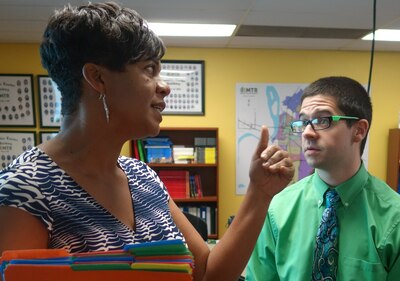
Their training occurs in the same type of schools that they will ultimately teach in, according to Robin Henderson. As an education professor in Indiana she found that traditional teacher-training programs didn’t give teachers a chance to do their training in low-income areas.
“There are teacher prep programs doing phenomenal work on behalf of students and teachers,” Henderson said. “But when the student-teachers are not having the opportunities to train in the context in which they’ll ultimately serve, that presents some challenges to first year teachers.”
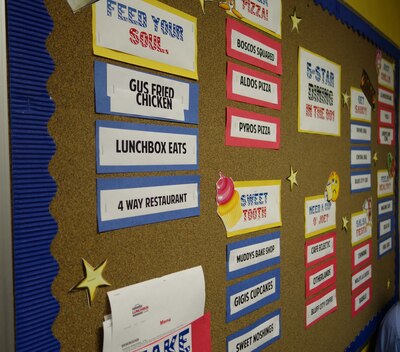
With growth come challenges to maintain the same level of quality and to raise the money to support more teachers.
Montague has to fundraise $50,000 for each new teacher they bring on. He hopes that at some point Shelby County Schools will see MTR’s training as valuable and will help pay the cost of attracting more.
Teachers are given a $12,000 stipend for the first year of training.
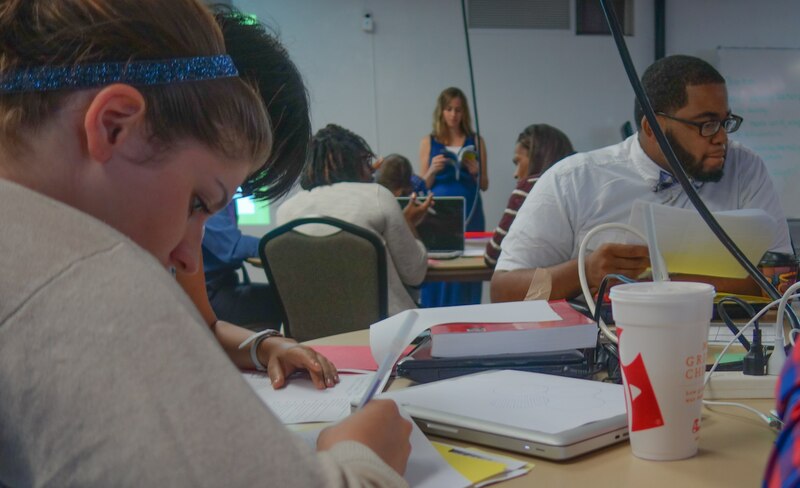
Closing Time
Before teacher residents headed for their July 4 three-day weekend, Luttrell wanted to send one last message.
“Just because Jesus didn’t go on the speaking circuit, doesn’t mean he didn’t address the core values of leadership,” Luttrell reminded her future teachers, in the basement of a church, on a hot Memphis summer day. “If you want to lead, you have to serve.”
KENDRA, 1st year
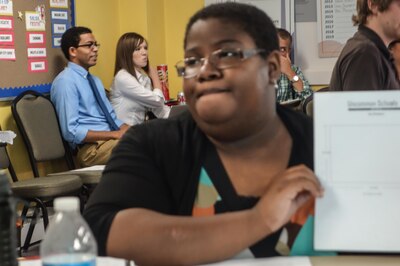
Kendra Cunningham wanted to find a job where she could live out her faith everyday, rather than sit in a lab as a scientist. She saw the opportunity to inspire more African-American women to become scientists if she became a teacher.
But this is the first time she has moved away from Virginia and, just four weeks into the program, she said she and her mom are still adjusting.
“I am the baby,” Cunningham said. “She misses me a lot but at the same time she is proud, that God has called me to be here. But that has been hard.”
She comes from a Pentecostal background and says she is still trying to find a church community in Memphis where she’ll feel at home and not just a number.
“I need some things to be clarified because I’m kind of anxious,” she said during a session on building relationships with students. “I know it’s important to establish a classroom climate but we can’t just do relationship building for the first three months. We have to get down to chemistry at some point, right?”
BLAKE, 2nd year
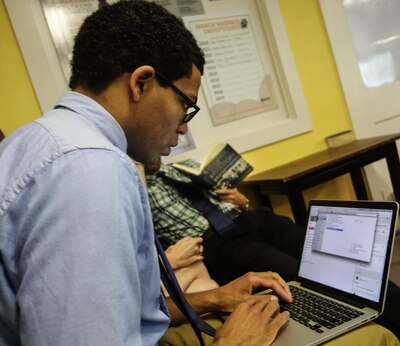
Blake Lam, 24, applied to Teach for America out of college, but decided he wasn’t ready. After a year of web and graphic design work, he decided that he didn’t want to be stuck behind a computer, but be part of a community. When he learned about MTR, he thought Christian background of the program was perfect for him.
“Just being a really good teacher, is the clearest and most tangible way to live out my faith in the workplace,” Lam said. “I think my students are created by God and made in God’s image. Even if I’m not sharing my faith explicitly, I’m doing what I’m called to do by caring for them. They have needs that go beyond spirituality.”
He says the residency year last year helped him feel more prepared for his first teaching assignment this year, at Handley Elementary teaching 6th grade math. His mentor teacher, Ashley Simmons, pushed him to be less robotic and act more like himself in front of his students.
But at the same time, he had to push past some of his natural tendencies. He had trouble giving consequences to students because he thought it would sacrifice his relationships. An interaction with one student that changed and made him more prepared to take on his own classroom for the first time this year:
“I asked him to tell me the truth and he didn’t tell me the truth,” said Lam. “And two times I didn’t give him the consequence when I should have and the third time I followed through with the consequence. He was crying, yelling, saying he didn’t want to be in my groups anymore. I think at the beginning of the year I would’ve thought that the relationship was hopeless. Instead of having that mindset, I decided to be patient. I asked him during lunch, do you want to sit on your own or do you want to sit with me and talk it through? I expected him to want to sit on his own, but he said he wanted to sit with me. So I sat with him at lunch and talked about what had happened. I really saw the power of relationships with students. I can follow through with a consequence and not destroy a relationship.”
EMILY, 6th year

Emily Vassar, 33,—one of the founding MTR teachers—started her sixth year teaching Algebra I to 9th graders at Kingsbury High School this year.
She has known since high school that she was destined to be a teacher. Her own high school math teacher pushed her to excel and even let her teach class on occasion. After college she did ministry work in Seattle for a few years, until she was finally drawn to Memphis and then into the profession she always thought she was destined for.
During her first year of mentoring, she learned the ropes such as how to work the copier.
“Being with a master teacher taught me so many of the little bitty things that nobody can warn you about,” said Vassar. “I could focus on the important stuff because I knew how to navigate the details in the building quickly.”
There are now four MTR teachers at her school, which Vassar said means she receives more students who are on grade-level. More than twice as many of her students scored advanced on the Algebra I exam this year than at the average Shelby County School. “It wasn’t me trying to catch them for several years of education they were lacking, but being able to build on the education they are coming to me with,” Vassar said.
Teacher turnover has gone down recently as well. “I tell them I’m going to be at your graduation and I want you to be there too,” Vassar said. “It means something when I really am.”
She also says she has gotten better every year. “I’m technically going into my fifth year of solo teaching,” Vassar said. “But I feel like I’m just now getting my feet under me.”
She’s been motivated to continue teaching in part because of efforts such as community partnerships in Kingsbury, such as Streets Ministries.
“I can see myself staying forever, I can see myself staying for another five to 10 years,” Vassar said. “It all depends what opens up.”
